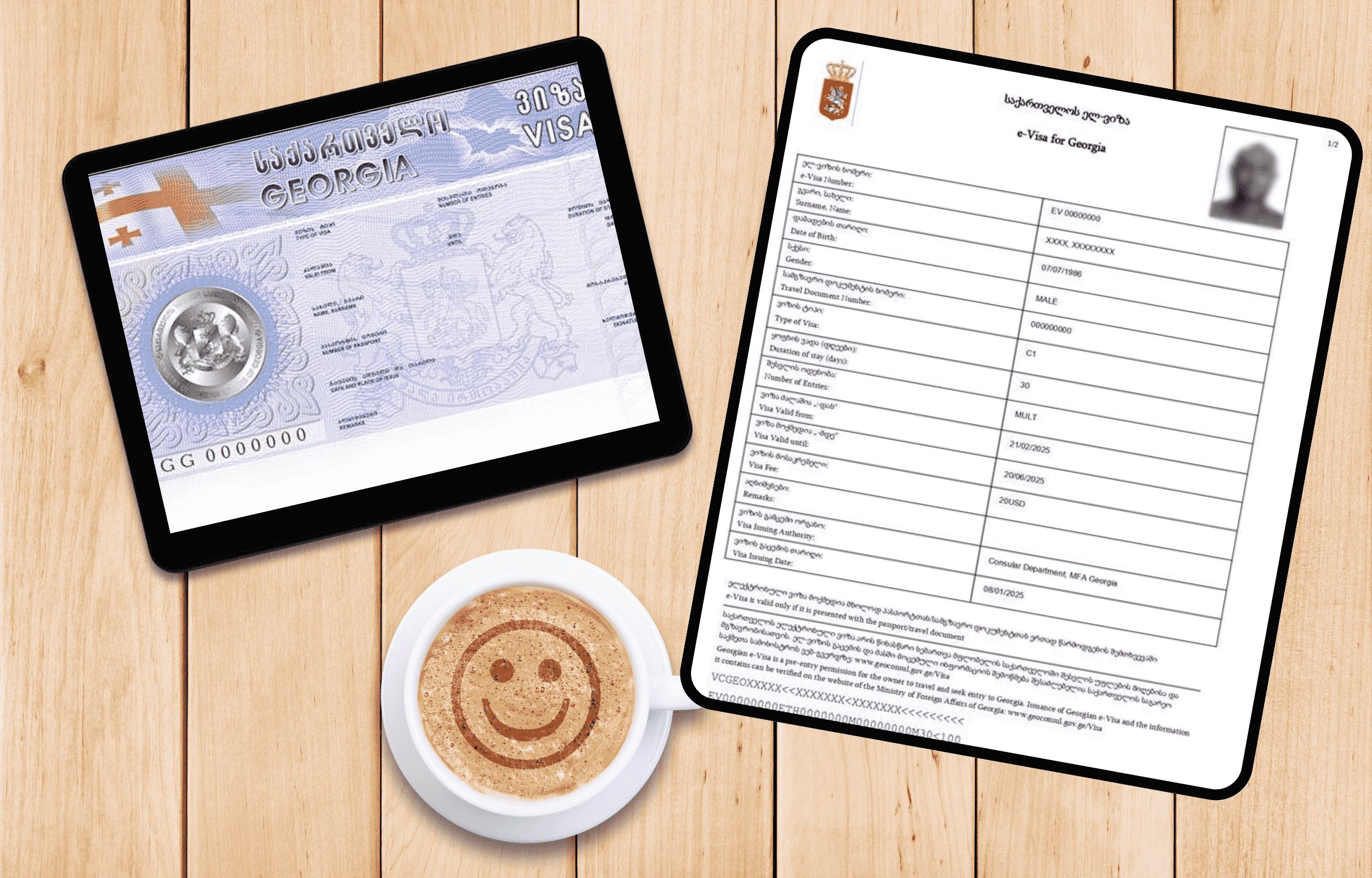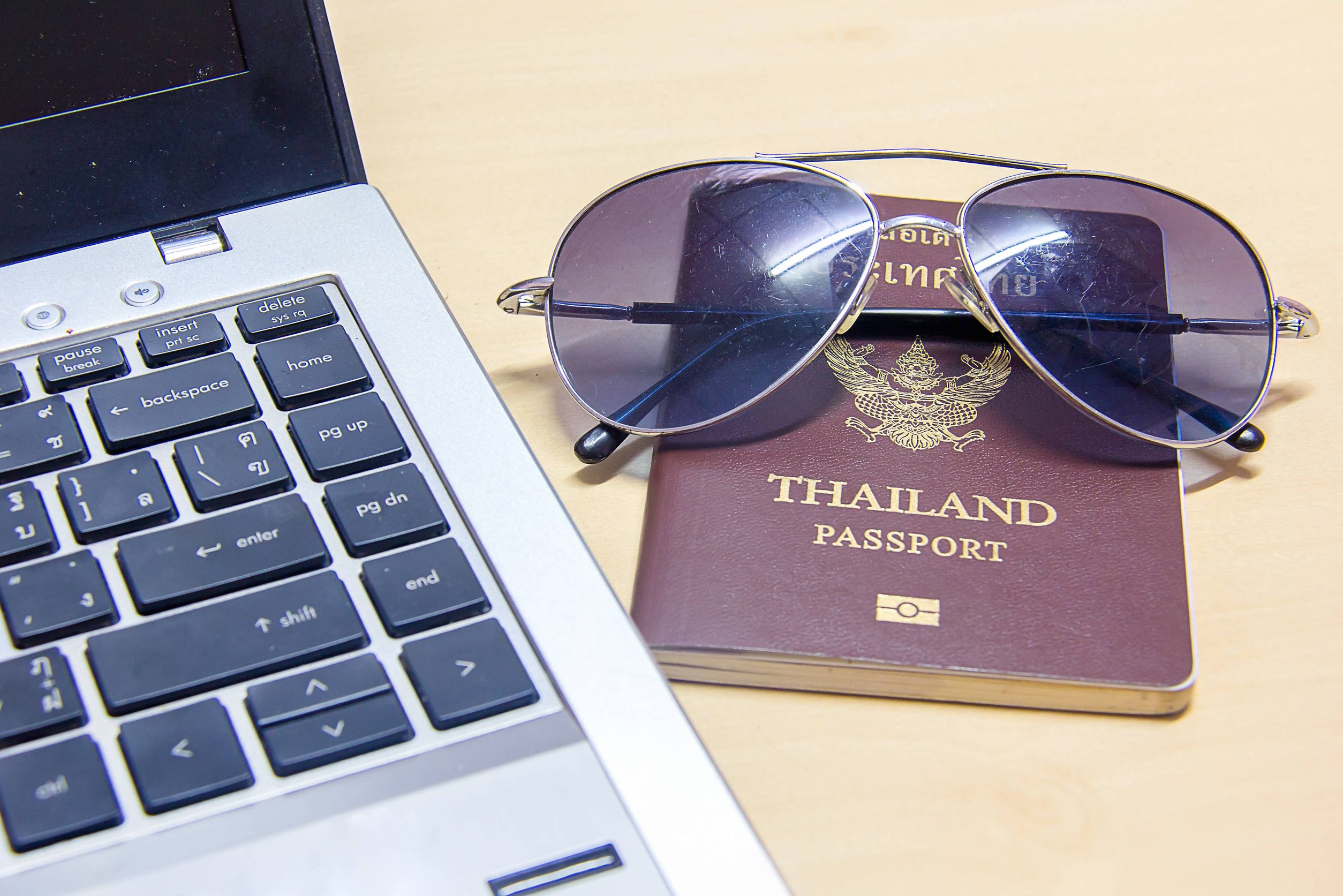
Last updated: January 2026
Explore the differences between electronic and traditional visas for Georgia, unveiling the conveniences and intricacies associated with each application process for seamless travel planning.
Comparison of Application Processes
When planning a trip to Georgia, understanding the differences between applying for a Georgia eVisaand a traditional visa is essential. Each visa type comes with its own set of procedures, requirements, and processing times. Below, we'll explore the distinctions between the two application processes to help you determine which option suits your needs best.
|
Feature |
Georgia eVisa |
Traditional Visa |
|
Application location |
Online |
In person at an embassy/consulate |
|
Application Form |
Electronic |
Paper form |
|
Required documents |
Passport, digital passport photo (may vary) |
Passport, physical passport photo, additional documents (invitation letter, proof of accommodation, financial proof) |
|
Processing time |
Typically 3 business days |
Several weeks |
|
Fees |
Government fee + eVisa processing fee (if applicable) |
Government fee + embassy/consulate service fee + potential expedited processing fee |
|
Convenient |
More convenient |
Less convenient |
|
Speed |
Faster |
Slower |
|
Cost |
Potentially less expensive |
Potentially more expensive |
|
Suitability |
Short stays, tourism, business trips (up to 90 days) |
Longer stays, specific purposes (study, work) |
Georgia eVisa vs. Traditional Visa Processing Time
The processing time for obtaining a visa to Georgia varies depending on the type of visa applied for and various factors. Here's an overview:
- Georgia eVisa Processing Time: Typically, the processing time for Georgia eVisa is swift, taking up to (...). However, certain cases may require additional processing time.
- Traditional Visa Processing Time: Processing times for traditional Georgia visas can be longer, spanning several weeks. The duration depends on factors like visa type, applicant nationality, and embassy workload.
- Factors Impacting Processing Time: Several factors influence processing times, including application accuracy, embassy workload, and additional checks. Unexpected events or surges in applications may also affect processing.
- Expedited Processing: Both visa types offer expedited processing for an extra fee, significantly reducing processing time.
- Planning Ahead: To avoid delays, applicants should apply well in advance, review requirements meticulously, and ensure all documents are accurate and complete.
Comparing eVisa and Traditional Visa Costs
The expenses associated with obtaining a visa for Georgia can differ depending on the visa type and the applicant's nationality. Here's a breakdown of the cost disparities between the eVisa and traditional visa:
- Government Fees: Both the Georgia eVisa and traditional visa entail government fees established by the authorities. The eVisa and traditional visa fees are contingent on visa type and applicant nationality.
- Service Fees: Apart from government fees, applicants may need to pay a service fee to the visa processing entity or embassy/consulate. For the eVisa, service fees are slightly lower for standard processing, Fair for rush processing, and relatively higher for super rush processing. Traditional visa service fees may vary and could exceed eVisa service fees.
- Additional Expenses: Applicants should also consider supplementary costs associated with visa acquisition, such as transportation to the embassy/consulate, photocopying/printing fees, and visa photo expenses.
Comparing Visa Terms: eVisa vs. Traditional Visa for Georgia
Understanding the validity period and duration of stay is essential when considering the Georgia eVisa versus the traditional visa. Here's a comprehensive comparison of these crucial aspects to help you make an informed decision:
|
Feature |
Georgia eVisa |
Traditional Visa |
|
Validity period |
Up to 30 days or 90 days from the date of issue, depending on your nationality. |
Up to 5 years (depending on visa type and nationality) |
|
Maximum Stay per Visit |
Up to 30 days |
Up to 30 days |
|
Important Consideration |
Maximum 90 days stay within any 180-day period or 30 days stays within 120 days |
It may be suitable for longer stays or multiple entries, depending on the type of visa you are applying for |
|
Best for |
Shorter stays, single entries |
Longer stays, multiple entries (depending on visa type) |
|
Convenience |
More convenient (apply online) |
Less convenient (apply in person) |
|
Cost |
Potentially less expensive |
Potentially more expensive |
Choosing the Right Visa for Different Travel Purposes in Georgia
Selecting the most suitable visa type for various travel purposes in Georgia involves considering factors such as the nature of the trip and the duration of stay. Here's a breakdown of which visa type may be best suited for different travel intentions:
- Tourism: Short-term tourism trips are often well-suited for the Georgia eVisa, offering a stay of up to 30 days. The quick and online application process makes it convenient for many tourist activities. However, longer stays may necessitate a traditional visa.
- Business: Business travellers, especially those requiring extended stays or multiple entries, may find a traditional visa more suitable. Certain business activities might mandate specific visa types, like a business visa, for negotiations or contract signings.
- Study: Prospective students planning to study in Georgia typically require a traditional visa, particularly for longer stays exceeding 30 days. Specific visa categories, such as student visas and additional documentation like acceptance letters from educational institutions, might be necessary.
Accessing Visas for Georgia: eVisa versus Traditional Visa
When evaluating the accessibility of visa options for Georgia, several factors come into consideration:
1. Georgia eVisa
The eVisa process for Georgia provides a straightforward and accessible application method, accessible online from anywhere with internet connectivity. Applicants are relieved from the obligation to physically visit an embassy or consulate, which benefits those residing far from such establishments. The online application interface is user-friendly, facilitating efficient completion.
2. Traditional Georgia Visa
Acquiring a traditional Georgia visa typically entails a more intricate process, mandating applicants to visit an embassy or consulate personally. The accessibility of these locations might vary depending on the applicant's country of residence. Furthermore, traditional visa applications often involve a more extensive documentation requirement and longer processing duration.
Supplementary Requirements for Georgia Visas
The Georgia eVisa and traditional visa may require additional documentation based on the traveller's purpose and circumstances. Here's an overview of potential supplementary requirements for each visa type:
- Georgia eVisa: Beyond the fundamental application prerequisites like a passport and photo, eVisa applicants might need further documentation contingent on their travel intentions. For instance, business travellers may need to furnish a letter from their employer or a business licence copy. Moreover, proof of travel insurance, return ticket, and accommodation details might be mandatory.
- Traditional Georgia Visa: The visa application process may demand more extensive documentation than the eVisa process. Additional requirements could vary based on the travel purpose. Common prerequisites for traditional visas include proof of travel insurance, a return ticket, evidence of financial capability to sustain oneself in Georgia, and a medical certificate.
Extending Your Visa in Georgia: eVisa vs. Traditional Visa

The possibility of extending a visa in Georgia differs between the eVisa and traditional visa types. Here's what you need to know about each:
|
Visa Type |
Extending Your Stay Possible? |
Requirements |
|
Georgia eVisa |
No |
Not possible - apply for a new eVisa or a traditional visa if needed. |
|
Traditional Visa |
Yes |
- Initiate the extension process at least 30 days before expiration. - Valid reason for extension (medical treatment, unforeseen circumstances etc.). - Additional documents: explanation letter, proof of finances, copy of current visa. - Extension fee (varies depending on visa type and duration). |
Disclaimer: This information is intended for general guidance and was last updated in January 2026. While we strive to ensure the accuracy and completeness of the information, we cannot guarantee it and accept no liability for any errors or omissions. Visa requirements, application procedures, and fees are subject to change, and applicants should verify the most current information through the official government website or relevant authorities.
FAQS
The main differences between the Georgia eVisa and the traditional Georgia visa are: The Georgia eVisa is obtained electronically, while the traditional visa involves a stamped document affixed to the passport.
The application process differs between the Georgia eVisa and the traditional visa as follows: The eVisa application is completed online, whereas the traditional visa requires a paper application submitted in person at an embassy or consulate.
The typical processing time for the Georgia eVisa compared to the traditional visa is: The Georgia eVisa has a shorter processing time, usually taking only a few business days, whereas the traditional visa may take several weeks to process.
The cost differences between the Georgia eVisa and the traditional visa are: Unlike the traditional visa, the Georgia eVisa is generally less expensive, with no additional costs for travel to embassies or consulates.
Travellers preferring a physical visa stamp or needing longer stays beyond the e-Visa's validity period might opt for the traditional Georgia visa.

To help us improve